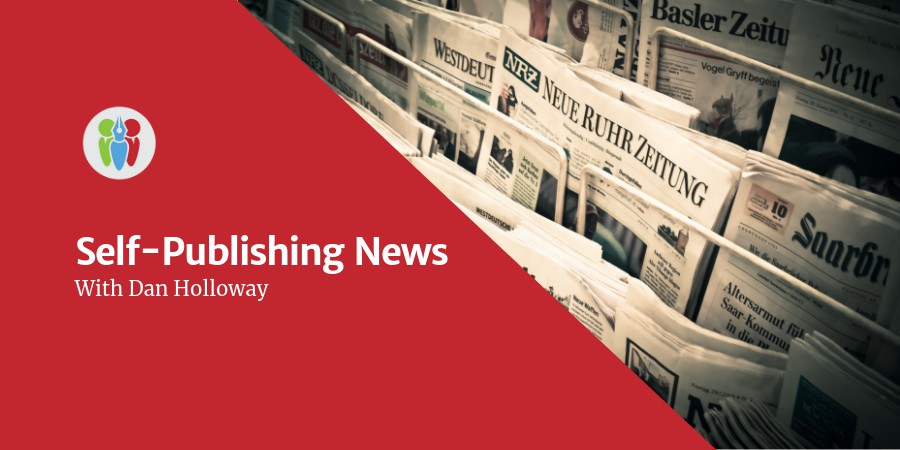
ALLi News Editor Dan Holloway
In this week's Self-Publishing News, ALLi News Editor Dan Holloway fills us in on the latest with a look back at this year's Futurebook conference.
Rather than use this preamble, as I usually do, to reflect, I want to look ahead. Specifically, I want to look ahead to tonight’s #indieauthorchat on Twitter (at 8 pm GMT). This week the subject is mental health. I had my first breakdown three and a half decades ago and I have been a mental health campaigner for more than a decade. It’s something we talk about far too little in the writing world where we spend so much time smiling and pretending everything’s fine. I look forward to some non-silence tonight.
Futurebook: How much tech should you know?

Photo by Yvette de Wit on Unsplash
This week's news has a special focus on Futurebook, which I had the good fortune to attend yesterday thanks to a very kind colleague. The two keynotes that grabbed me the most looked at how we might do things differently in future. Emma Barnes of Consonance and Snowbooks talked about Day of Code. Day of Code, which took place last week, saw 40 people in publishing learn the coding skills necessary to build a website. Emma Barnes has been passionate about coding in publishing ever since writing her brief manifesto on the subject 5 years ago. It’s something that as indies we should be doing more. I make no secret of my belief that we need to know more tech. As Emma put it – it’s cheaper to teach publishers to code than coders to publish – and that goes double for indies. And the great news is that the exercises from the day are all available on GitHub for anyone to use.
The other reason to know more tech is to know enough to avoid hype bubbles. As indies we will be increasingly bombarded with offers around the likes of AI and blockchain and we need to know what to avoid. This week’s fascinating expose of the multibillion dollar OneCoin scam brings that home.
Futurebook: Publish Differently
Akua Agyemfra from Stormzy’s Merky books provided wonderful insight into what publishing differently might mean and how it might apply to us. She discussed pop up bookshops (events you might not think of, based on books). There was also Derek Owusu’s Teaching My Brother To Read, a multimedia project that will tell the same story across different media.
Indeed, bookshops featured in very different ways. The opening keynote from James Daunt raised many eyebrows. “Don’t be boring” was the frankly boring message. And he insisted that each Waterstones store has autonomy and uses centralisation as an excuse to get rid of pesky authors. Hmm. On the other hand, we heard from Darren Buffonge “You don't need a bookshop to sell books…get over the idea there's a physical church that's a bookshop.”
And Rose Cartwright explained how being indie gives an opportunity to discover mass markets we don’t know are there. When it comes to mental health, she explained, publishers insisted again and again to her there is no audience. She has shown there is by going indie.
As indies we are blessed with the opportunity to try and fail. We should be at the forefront. The quotation I will take away from Futurebook the most came from Hachette’s Kate Espiner’s. She said of the publishing industry: “what we think of as innovating isn’t very innovative.” That’s so true, and often more so of indies. But that’s something we can change.
Futurebook: Data
Inevitably much of the indie interest at Futurebook was in Paul Abassi, the guy formerly known as Data Guy. And there was a lot of great data to chew on the ebook market. Most notably:
The are big differences between the UK and US markets. US price points are higher. Book sales sustain over a longer period in the UK. And the big 5 have only half the market share in the US they do in the UK.
The contribution of self-publishing to the UK ebook market is huge. In the past 6 months self-published titles and single author imprints accounted for around £40million out of a total of around £170m.
The genres that are most dominated by self-publishing are a mix of the expected (Romance, Science Fiction) and the surprising (not crime, except “British detectives” and “women sleuths”).
StreetLib on the March
I've been talking about international markets a lot recently. StreetLib are a company at the forefront of the globally local movement. For one thing, they have committed to having a local digital store in every African market by 2025. Now it has new partnerships with Kobo and Bookbeat. These will allow increased ebook and Audiobook distribution through all platforms. In addition it has added partnerships with Audiobooks.com, Media 365, and Ubook to its portfolio.
What #Futurebook19 means for indies and StreetLib continue to expand their reach & other top #selfpub news stories for #indieauthors, in one quick read, by #ALLi News Editor Dan Holloway @agnieszkasshoes #digitaleconomy… Share on X
Over to You
What unique opportunities has being indie offered you to do things differently? Let us know in the comments below.
Upcoming Conferences and Events
DECEMBER 2020
Authors' Book Fair, 14 Dec [Brighton]
FEBRUARY 2020
San Francisco Writers' Conference, 13-16 Feb [San Francisco]
MARCH 2020
London Book Fair, 10-12 Mar [London]
APRIL 2020
Self-publishing Conference, 25 Apr [University of Leicester]




